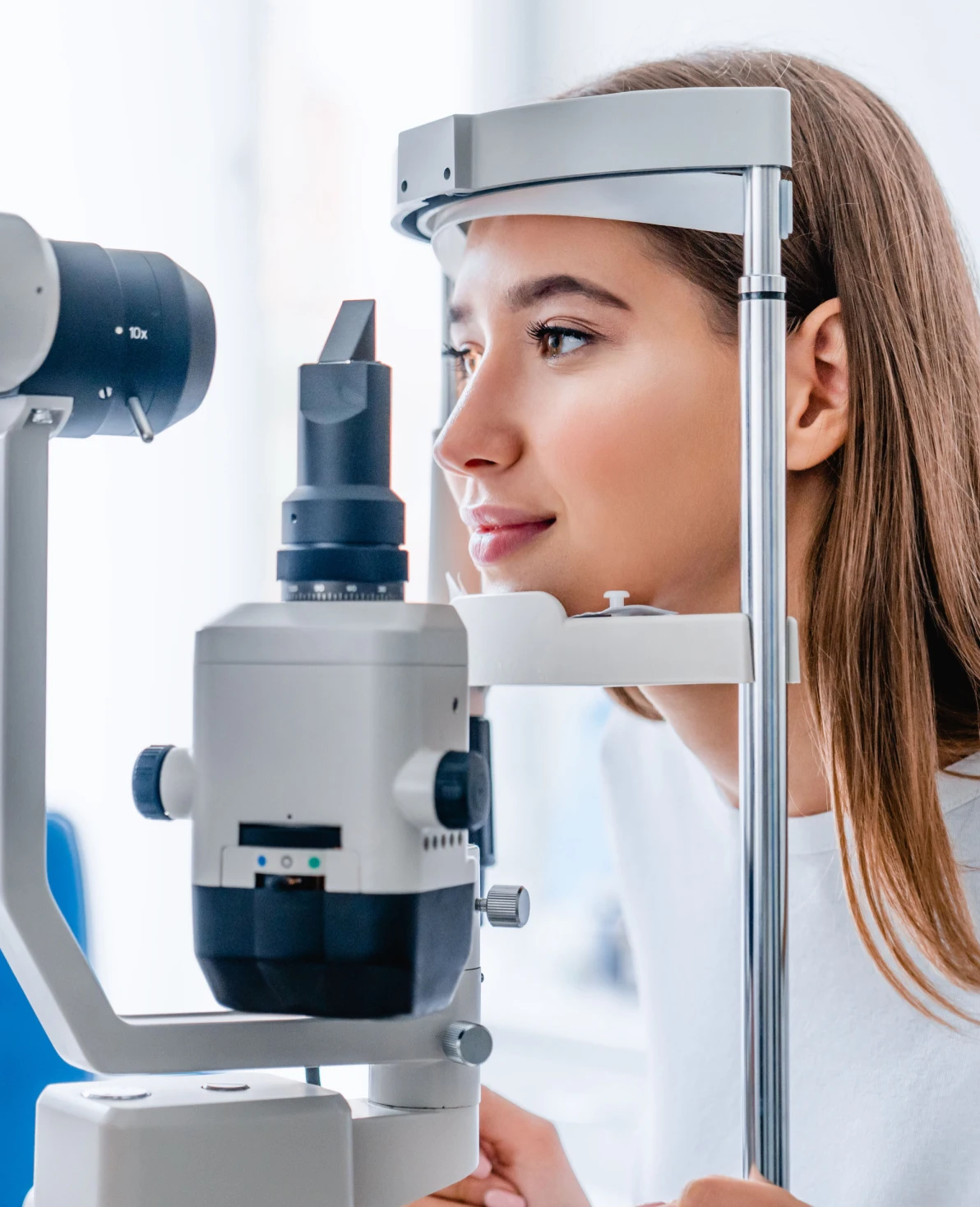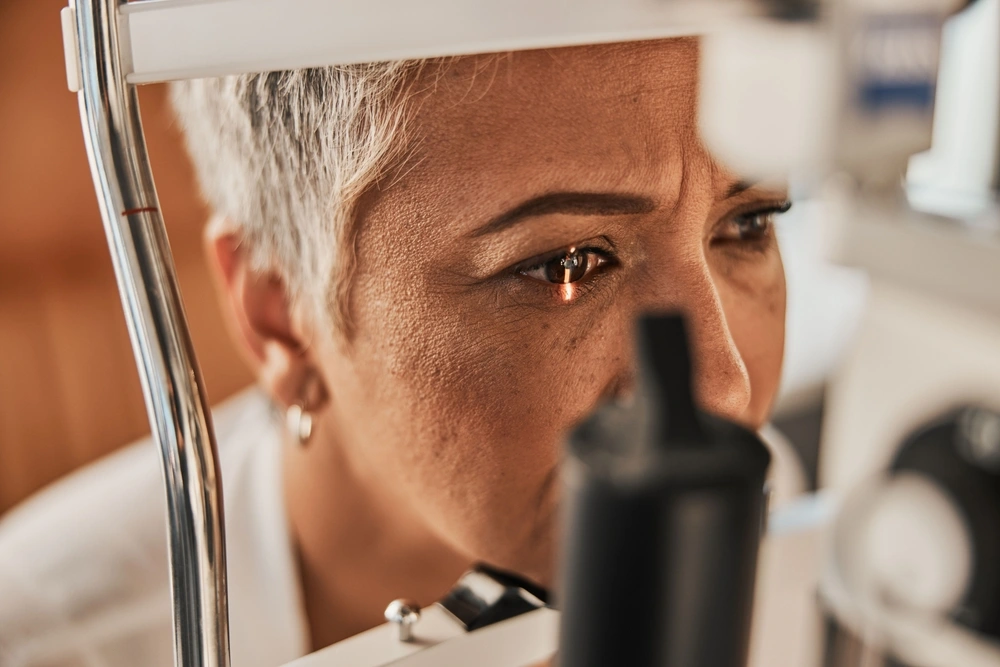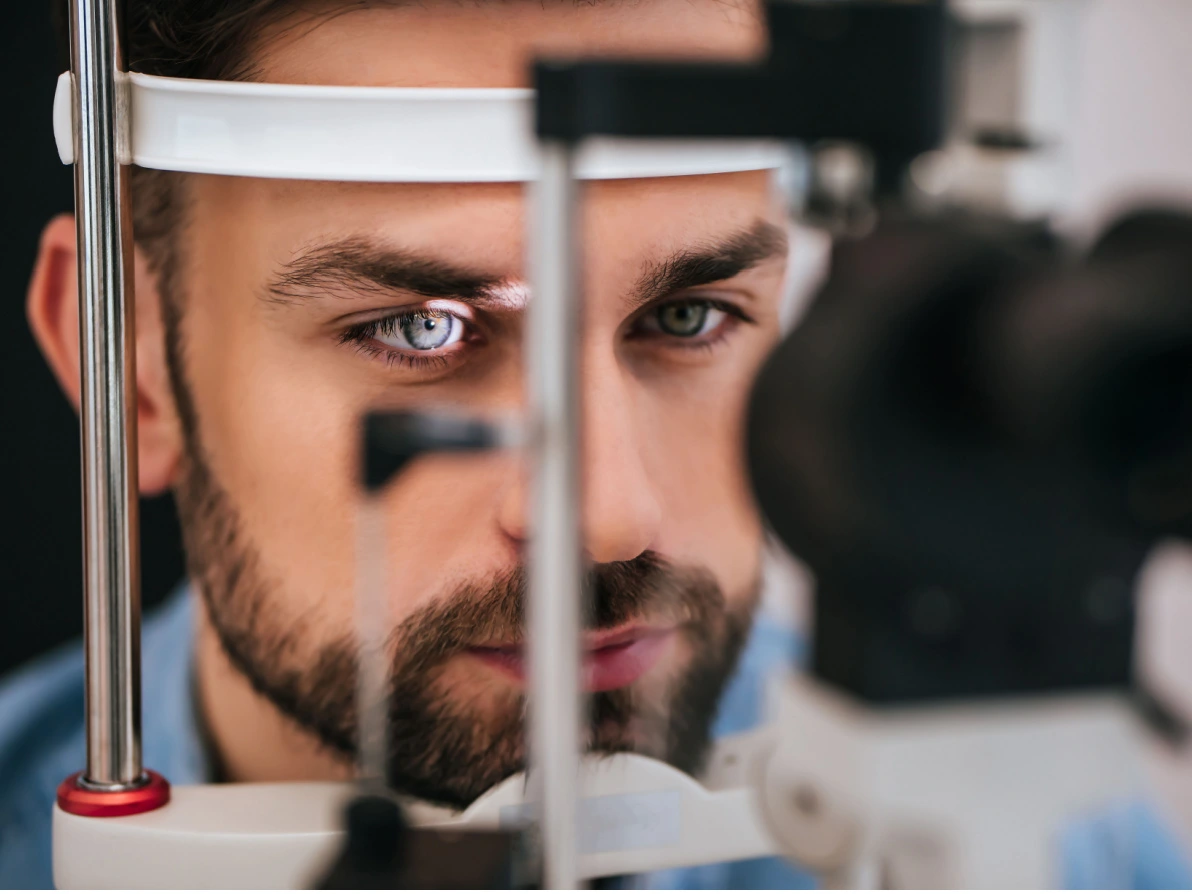Your comprehensive eye exam at Houston’s Diagnostic Eye Center will include a thorough evaluation of all parts of the visual and ocular system. Some patients can have eye diseases without experiencing any symptoms, and a complete eye exam can help detect these conditions. Our Houston Ophthalmologists Dr. Andrew Salem and Dr. Marc Sanders and Houston Optometrists Dr. Aric Welton and Dr. Stephanie Lozano are committed to providing the best care for your eyes.
Did you know that many systemic conditions, like diabetes and high blood pressure, are sometimes first diagnosed through an eye exam? When we examine the retina, we are able to see the small blood vessels in the back of the eye. In this case, the eyes truly are the window to the soul, because these blood vessels can let us know how your overall health is doing. If there is bleeding or leaking of these vessels, that can indicate a more serious condition going on throughout the body.
We can also diagnose things like stroke, cancer, autoimmune conditions, and sexually transmitted diseases, just by doing a comprehensive eye exam. Oftentimes patients have no idea they have these conditions, and in some cases, an eye exam can be life-saving.
Your comprehensive eye exam includes evaluation of the following:
- Visual acuity
- Need for eyeglasses or contact lenses
- Coordination and function of eye muscles
- Peripheral (or side) vision
- Pupillary response
- Accommodative response (focusing ability of the eye)
- Intraocular pressure (pressure inside the eye)
- Eyelid health and function
- Anterior segment of the eye, including the cornea, conjunctiva, iris, and lens
- Posterior segment of the eye, including the retina and optic nerve (this usually involves the use of eye drops to dilate your eyes)
- Presence of ocular diseases, including glaucoma, macular degeneration, dry eye disease, amblyopia (lazy eye), and diabetic eye disease

“My routine eye exam was very thorough and my doctor was very detailed and informative. I understood what was being done and even more educated of my current vision status! I have no hesitation in referring everyone I know to Diagnostic Eye Center.”

What should I bring to my eye exam?
Please bring all currently used glasses for your appointment. Even if your glasses are broken, we can generally still measure them to determine if there has been a change in your prescription. If you wear contact lenses, please bring your contact lens boxes or packages so we know exactly what lenses you have been wearing.
Be sure to bring a list of all current medications, including any vitamins or eye drops, as well as your insurance cards and a form of identification.

What Can An Eye Exam Can Tell You About Your Health?
What may seem like a minor vision problem now can sometimes be the first symptom of something more serious. Getting regular eye exams is important, allowing your eye doctors to detect a range of health problems early on.
Your eye exam could reveal one of these health problems:
Multiple Sclerosis (MS)
MS is a harbinger of optic neuritis (optic nerve inflammation) for many with the disease. Optic neuritis occurs in 75% of patients with MS.
If you have double vision or uncontrolled eye movements, tell your eye doctor so they can check to see if you have any abnormalities in your optic nerve or retina.
High Blood Pressure
If your blood pressure is above 120/80, it’s considered too high. Elevated blood pressure is also a risk factor for developing diabetes, blindness, metabolic syndrome, and heart disease.
During an eye exam, your eye doctor can tell if you have uncontrolled high blood pressure by analyzing blood vessel damage in your eyes. This is usually characterized by the weakening and narrowing of the arteries.
Brain Tumor
Your eye exam could help to detect if you have a brain tumor. If you have a brain tumor, your eye doctor may notice that you have blurry vision, one eye dilated more than the other or one remains fixed, and they may detect changes to optic nerve color or shape.
If your eye doctor does suspect something isn’t right, they may refer you to a neurologist for further diagnosis.
Brain Aneurysm
Brain aneurysms are incredibly dangerous and can cause death if they are not caught before a blood vessel breaks. Tell your eye doctor if you experience symptoms like eye pain, headaches, loss of vision, or blurry vision.
They will check to see if you have increased eye pressure, retinal bleeding, swelling of the optic nerve, and/or drooping eyelids. Tell your eye doctor if you experience crossed eyes, as this is may be a symptom of an aneurysm or a stroke.
If a brain aneurysm is caught early on, it is possible to treat it.
Hypoglycemia
Do you have unusual eye tics, shakiness, or sweating that won’t go away? During your eye exam, your eye doctor may find that you are hypoglycemic.
Your eye doctor will look for other signs, like having blurry vision, as well. Being hypoglycemic means that you have abnormally low blood sugar levels.
The condition is linked to diabetes, metabolic problems, and diseases of the pancreas, kidneys, and liver.
Vitamin A Deficiency
You may develop this if you aren’t eating enough fruits and vegetables. Symptoms to watch out for include vision loss and night blindness.
If you find yourself suddenly unable to see well at night, let your eye doctor know. During your eye exam, your eye doctor will check the surface of your eye to see if it has suffered any damage.
Melanoma in your eyes
Did you know that you can get freckles in your eyes? That means that you can get melanoma or skin cancer of the eyes as well.
A freckle in the eye (also known as a nevus) can occur on the iris, where it may be visible to you, or on the retina. A nevus in the back of the eye can only be detected during an eye exam and should be monitored at least annually thereafter.

What an Eye Doctor Looks for During an Eye Exam
When you go for your eye exam at Diagnostic Eye Center in Houston, Texas, you’ll see one of our qualified ophthalmologists or optometrists. During an eye exam, we’ll examine your eyes for any ocular diseases and other conditions.
Common conditions screened for include:
Cataracts
Cataracts occur when the lens of the eye becomes cloudy and hard to see through. This happens when proteins in the lens clump together and build up over time.
Cataracts can start to form as early as your forties or fifties, but they can take years or even decades before they start to affect your vision. At this point, your eye doctor may recommend cataract surgery for your best quality of life and vision.
Glaucoma
Glaucoma is an eye disease that causes permanent, irreversible damage to the optic nerve. Most patients with glaucoma don’t realize they have it until they have already experienced vision loss.
Because of this, glaucoma is often referred to as “The Silent Thief of Sight” because it has almost no discernible symptoms. Regular eye exams are one of your best lines of defense against glaucoma since it’s one of the only ways to prevent vision loss before it begins.
If you do have glaucoma, early detection is crucial for preserving your remaining vision. Glaucoma is one of the leading causes of blindness in the country.
Diabetic Retinopathy
For anyone with diabetes, diabetic retinopathy is a serious concern. Diabetic retinopathy occurs when there is damage to the blood vessels in the retina.
This condition is most likely to develop in patients whose blood sugar levels are not under control. Even if your blood sugar is under control, if you are a diabetic, you are at risk of developing diabetic retinopathy.
Patients with diabetes should see their eye doctor for yearly eye exams with dilation.
Prescription Changes
If you wear glasses or contacts, you should see your eye doctor every year to make sure your prescription hasn’t changed. Having an eye exam is the easiest way to check your eyes and see if you need anything updated.
If you wear contact lenses, you need an up-to-date prescription from your eye doctor every year before you can order new contacts. If you’re walking around in glasses or contacts that don’t feel right, this is the perfect time to contact your eye care provider.
Seeing your eye doctor ensures you’ll have an up-to-date prescription and your eyes are healthy and happy.
Symptoms of Dry Eye Syndrome
Experiencing dry, itchy, or irritated eyes? You may have dry eye syndrome. During your eye exam, let your eye doctor know, as dry eye syndrome is incredibly common.
It’s also treatable. It occurs because the eye produces low-quality tears or not enough tears. If your eye doctor suspects that you have dry eyes, they will evaluate the quality of your tears and tear film during your comprehensive eye exam.
This will give them an understanding of how to treat your symptoms and get your eyes back to feeling their best!
If you think you may need an eye exam, schedule one now at Diagnostic Eye Center in Houston, TX! Your eyes will thank you, and you can rest assured that you are keeping up with vital health checks that can diagnose problems early on.
Schedule your Eye Exam at Diagnostic Eye Center
Please contact us with any questions about your insurance benefits, and our insurance verification specialists will be happy to assist you. We look forward to your visit to Diagnostic Eye Center!
The doctors at Diagnostic Eye Center have reviewed and approved this content.


